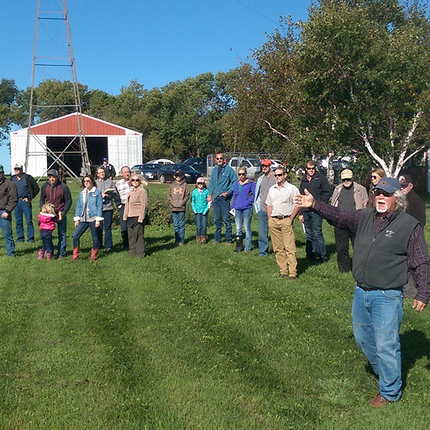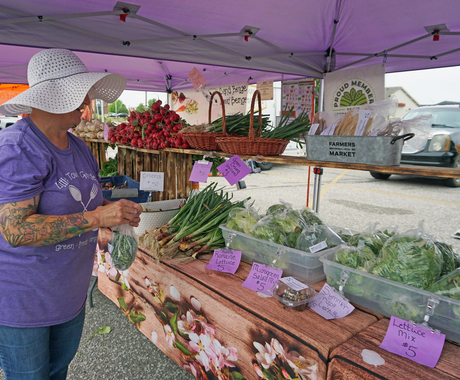By John Crabtree, former staff member
In early September, we launched the Let’s Talk Tour - a series of conversations across eastern South Dakota that we organized - to hear from rural and small town folks about climate, soil and water conservation, and issues related to the region’s energy future. And we talked, but perhaps more importantly, we listened.
The highlight of the tour for me came when I met Luke Peterson and his family. Luke is a young, beginning farmer from near Dawson, Minn., in his final year of transitioning to organic production. He and his wife, and their young daughter Esther, traveled to a tour of Charlie Johnson's farm near Madison, SD.
They were there when we talked about Charlie’s cattle - with the cattle keeping a close eye on all of us. They were there when Charlie, decked out in jeans, a black fleece and baseball cap, stood and talked in front of a field of organic corn, turning golden with the approach of autumn, and a sign that read, “No Toxic Spray, Organic Farm.” And they were there, listening and participating in the presentations and discussions on soil health, conservation and concerns that organic farmers and marketers have about importation of foreign organic grain. OK, Esther colored pictures during the presentations, but she saw the whole day through.
During the farm tour, 33 farmers and other interested individuals from South Dakota, Nebraska, Minnesota, Wisconsin and Iowa visited half a dozen fields and other parts of the Johnson farming operation. I think Charlie summed it up best when he said, “I don’t think I can teach anyone how to farm organically, or how to do good conservation. I can just show you what we do and I think people can learn a lot that way. You may not be able to do it exactly the same way on your farm, but you can get ideas on ways you can try it at home.”
That’s pretty much how the day went. There were experts in attendance, particularly for the afternoon discussions about soil conservation research and organic marketing. But the free-wheeling discussion covered just about everything, from crop insurance and federal farm policy to the practical details of soil health and the use of grass and grazing to protect ephemeral streams and highly erodible or poorly drained land.
Moreover, even the end of the day’s itinerary couldn’t bring the conversation to an end. Many participants hung around for another hour, meeting people, asking questions and continuing conversations. It was during that hour that I was honored to meet the Peterson family.
Luke introduced himself and his family. I don’t get to meet farmers as young as the Petersons at every farm tour or event that we organize. But what really made my day was when I asked Luke how he felt about some of the issues that were discussed. “These issues will decide whether I have a future in farming,” he said. He talked with me about how important all of these issues are to him and his family, and how policy decisions about conservation, crop insurance and trade could determine if they are able to make it… or not.
We promised to keep in touch and keep talking, to each other certainly, but to others as well. In the end, that’s why the Center for Rural Affairs worked to create the Let’s Talk Tour - to make sure that voices like Luke’s and Charlie’s are heard, and not just by each other, but in government offices in Pierre, St. Paul, Lincoln, Des Moines, Madison and Washington, D.C. Meeting Luke and all the other farmers and concerned citizens that day makes me believe that we’ve had real success in getting these vital conversations started.



